It’s often been said that chickens are the “gateway drug” to farming, and it’s no different for KaasHill Farms. The family farm started with a small flock of chickens, and is now home to goats, pigs, chickens, guard dogs, and bees. Peter and Sheena Kaas and their small children are the hard-working farmers and soap makers behind KaasHill Farms.
 “We both became passionate about being the producers of our own food, and being a little bit more intimately connected with the growers around us,” Sheena shares. “And so that’s really where this started.”
“We both became passionate about being the producers of our own food, and being a little bit more intimately connected with the growers around us,” Sheena shares. “And so that’s really where this started.”
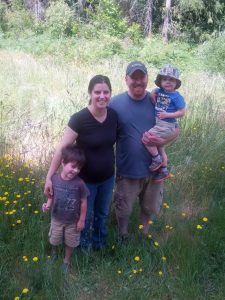
“It started when our son Collin, who is almost five now, was just a baby and we got our flock of six chickens, which I hear is like the gateway drug to farming,” she continues. “And then we thought, well let’s try some goats, and it just kind of went from there. We milked the goats for ourselves, and loved being able to share the milk and eggs with other people. It just felt so good. And, we thought, we want to do this, this is fun.”
The farm’s principle product is their luxurious goat milk soap. The small Shelton farm is comprised of the Kaas family – Peter, Sheena, Collin, Jacob, with another future farmer on the way. “First and foremost we wanted to create a farm for our family,” Peter explains. “We have searched for years for the right product mix, and the soap has been a wonderful avenue. We can have a small herd that is easily managed. We can milk by hand. It’s much easier to maintain.”
The soaps are made with fresh milk from the farm’s small herd along with olive and coconut oils, delightful fragrances, and other local farm and forest inspired ingredients like kelp powder and nettle. The soaps are naturally dyed and beautifully presented. “It was really important to us to make them look very gift-like. I like making beautiful things,” explains Sheena. “Our original business plan had nothing to do with soap, but I had made some soap for a gathering and it was well received, and that’s where it started.”
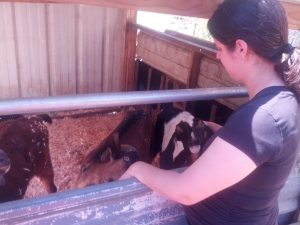
Sheena’s personal favorite is the chicken scratch, which is orange and lemon scented and contains ground eggshells for exfoliation. The Washington Forest, which Sheena initially developed as a tribute to her ancestors who were Olympic Peninsula loggers, is Peter’s favorite. In addition to the amazing forest scent, it contains nettle, a natural antihistamine, which is perfect for soothing the skin after handling hay all day. The Capri-cinno, with ground coffee, is perfect for washing away strong scents.
The soaps are currently available at the Poulsbo and Bremerton Farmers Market, at Farm Fresh Market in Olympia, and through the KaasHill website. Sheena is currently developing a premium line of soap that is crafted using organic oils and organic essential oils. The premium line will be available at markets and online this month.
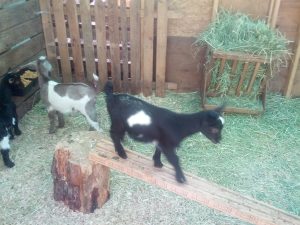
Sheena is from Shelton and attended college in Pullman, where she earned an Environmental Science degree and met Peter, who is originally from Salt Lake City. They moved back to Shelton to be closer to Sheena’s family and to start a family of their own. Sheena, a descendent of the Squaxin Island Tribe, has held several positions working for the Tribe, and after graduating from the Counseling and Psychology program at Saint Martin’s University last year, now works part-time as a mental health counselor for the Tribe.
Peter, who spent many years working in shipping and receiving in Seattle, currently attends The Evergreen State College, studying psychology and business management. Sheena explains that the two make an excellent team, balancing their strengths. “Peter’s the entrepreneur. He’s the one that can read about something, or watch a video about something, and just do it,” Sheena says. “I enjoy the more clerical stuff, behind the scenes. I actually enjoy the bookkeeping, developing records, that sort of stuff.” Sheena also handles all of the soap making, while Peter oversees the day-to-day operation of the farm.
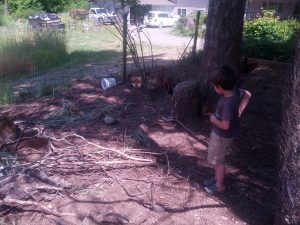
The whole family is an integral part of KaasHill. “Our son Collin collects the eggs and we teach him how to count the eggs at the end of the day. We’re showing him how to write it, showing him how to feed the chickens. We’re slowly increasing those responsibilities as he has the capacity. If, and when, he wants to, he can sell the eggs at the farmers markets. In a broader sense, our vision is to create a farm where our kids can develop their own enterprises. We want our kids to learn business skills through this too,” say Sheena.
“It gives our family some unity. Our family is really based on our religious beliefs, so we’re already unified in that way, but I feel like we have so many more interesting things to talk about. When we get to dream together about the future of our business and we get the opportunities to learn and grow and to pursue our interests in the business,” Sheena says.
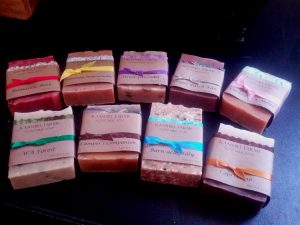
By growing slowly and deliberately, the farm is able to remain environmentally and fiscally sustainable. Peter explains that sustainable land management is the highest priority for the farm. They use intensive rotation of the animals to keep the land fertile and well-tilled without the use of synthetic fertilizer. They use the goats, then pigs, and then chickens to till the land, control for insects, and fertilize. “We consider ourselves more homesteaders than farmers. We want to do as much as we can to maintain those bygone skills,” Peter explains.
The small, sustainable farming and homesteading at KaasHill Farms is a win, win, win. The family is able to thrive on their land while their kids grow up learning practical and financial skills, the intensive rotation and lack of synthetic chemicals minimize the impact of farming on the environment, and excellent, local, sustainable products are available to the community.
To learn more, visit KaasHill Farms online.

















































